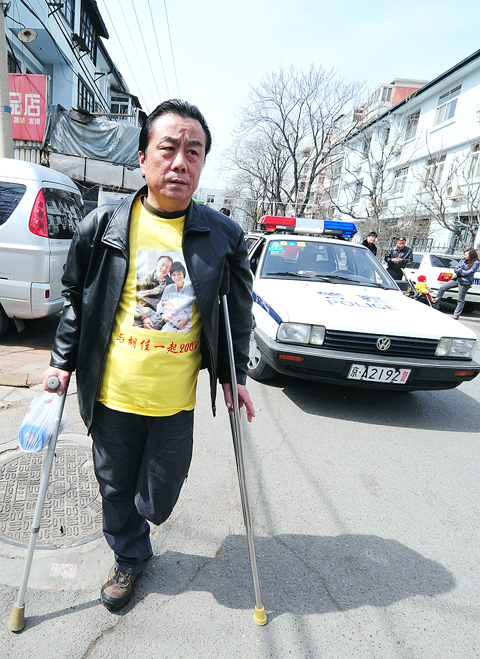Chinese dissidents reported being detained and harassed yesterday as authorities clamped down on the 20th anniversary of a reformist leader’s death that triggered the 1989 Tiananmen protests.
The anniversary is seen as the start of an ultra-sensitive period for Chinese Communist Party leaders as they will be forced to revisit the June 4 crackdown that killed hundreds, if not thousands, of people.
Qi Zhiyong (齊志勇), a well-known Chinese dissident who lost a leg when he was shot during the military crackdown, said yesterday he had been taken away by police.

PHOTO: AFP
“When I went out at seven o’clock to take my child to school, I was forced into a police car by state security police,” Qi said in a text message. “They have taken me to the outskirts [of Beijing].”
Qi said the detention was related to yesterday being the anniversary of the death of former communist leader Hu Yaobang (胡耀邦), who was purged in 1987 for his perceived weak response to student protests and died on April 15, 1989.
His death sparked calls for political reforms that led to the massive democracy protests in and around Tiananmen Square, which the Chinese military brutally quashed on June 4.
Other dissidents and a rights group also reported increased scrutiny yesterday.
Wang Songlian, research coordinator at activist group Chinese Human Rights Defenders, said a number of dissidents had told her of heightened tensions on the day of the anniversary.
“Today is a day when police have started putting people outside dissidents’ homes and following them,” she said, declining to immediately reveal their names before getting their permission.
“We have a number of people that have been subject to increased surveillance and some have been told not to go to meetings today where they could see other dissidents,” she said.
Jiang Qisheng (江棋生), a Beijing-based activist who was jailed for more than a year for participating in the 1989 protests, said police were watching him constantly in his native Jiangsu Province, where he had been staying for more than a week.
“They stand at the gate of my house guarding me without my permission and wherever I go they follow me,” he said by telephone.
“When I return to Beijing, I think it will be the same as it is getting nearer June 4,” he said.
Jiang, who was jailed again in 1999 after urging people to commemorate the 10th anniversary of the Tiananmen crackdown, said he had started coming under police scrutiny during the nation’s annual parliamentary session in March.
Some netizens, meanwhile, posted comments online about Hu, widely admired because he tried to rehabilitate the victims of the tumultuous Cultural Revolution and admitted mistakes in the handling of Tibet.
“The older generation’s opinion of him is good, it’s just a shame that afterwards at school we have not ever really heard of him,” said one posting on a popular Web portal.
Also See: Hong Kong students vote on Tiananmen motion
The Taipei Times ran an interview with Qi Zhiyong in its April 14 edition. Please see: The Tiananmen ache

SECURITY: As China is ‘reshaping’ Hong Kong’s population, Taiwan must raise the eligibility threshold for applications from Hong Kongers, Chiu Chui-cheng said When Hong Kong and Macau citizens apply for residency in Taiwan, it would be under a new category that includes a “national security observation period,” Mainland Affairs Council (MAC) Minister Chiu Chui-cheng (邱垂正) said yesterday. President William Lai (賴清德) on March 13 announced 17 strategies to counter China’s aggression toward Taiwan, including incorporating national security considerations into the review process for residency applications from Hong Kong and Macau citizens. The situation in Hong Kong is constantly changing, Chiu said to media yesterday on the sidelines of the Taipei Technology Run hosted by the Taipei Neihu Technology Park Development Association. With

CARROT AND STICK: While unrelenting in its military threats, China attracted nearly 40,000 Taiwanese to over 400 business events last year Nearly 40,000 Taiwanese last year joined industry events in China, such as conferences and trade fairs, supported by the Chinese government, a study showed yesterday, as Beijing ramps up a charm offensive toward Taipei alongside military pressure. China has long taken a carrot-and-stick approach to Taiwan, threatening it with the prospect of military action while reaching out to those it believes are amenable to Beijing’s point of view. Taiwanese security officials are wary of what they see as Beijing’s influence campaigns to sway public opinion after Taipei and Beijing gradually resumed travel links halted by the COVID-19 pandemic, but the scale of

A US Marine Corps regiment equipped with Naval Strike Missiles (NSM) is set to participate in the upcoming Balikatan 25 exercise in the Luzon Strait, marking the system’s first-ever deployment in the Philippines. US and Philippine officials have separately confirmed that the Navy Marine Expeditionary Ship Interdiction System (NMESIS) — the mobile launch platform for the Naval Strike Missile — would take part in the joint exercise. The missiles are being deployed to “a strategic first island chain chokepoint” in the waters between Taiwan proper and the Philippines, US-based Naval News reported. “The Luzon Strait and Bashi Channel represent a critical access

Pope Francis is be laid to rest on Saturday after lying in state for three days in St Peter’s Basilica, where the faithful are expected to flock to pay their respects to history’s first Latin American pontiff. The cardinals met yesterday in the Vatican’s synod hall to chart the next steps before a conclave begins to choose Francis’ successor, as condolences poured in from around the world. According to current norms, the conclave must begin between May 5 and 10. The cardinals set the funeral for Saturday at 10am in St Peter’s Square, to be celebrated by the dean of the College